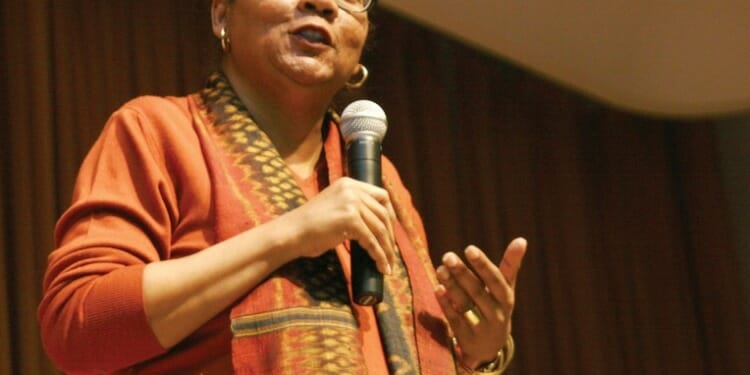bell hooks, born in Hopkinsville, Kentucky in 1952, published more than 40 books in her lifetime, covering topics including race, feminism, capitalism, and intersectionality, becoming one of the most influential figures of our time.
At the age of 69 on December 15, 2021, Gloria Jean Watkins, more famously known by her pen name bell hooks, died from kidney failure at her home in Berea, Kentucky. She changed her name as a tribute to her maternal great grandmother Bell Blair Hooks but changed the spelling to include only lowercase letters. A literary insistence that it is the work, the message and not the author that occupies the centre of one’s words.
bell hooks’ career truly began in 1981, as she published her first work “Ain’t I a Woman? Black Women and Feminism” acclaimed as an introduction to intersectional feminism in literature. She explored the effect of racism and sexism on black women, the civil rights movement, and feminist movements from suffrage to the 1970s. It became clear to her that the convergence of sexism and racism during slavery contributed to Black women having the lowest status of any group in American society.
This book was named “one of the 20 most influential women’s books in the last 20 years” by Publishers Weekly in 1992. It had, has, and will continue to influence some of the greatest writers, scholars, young girls and women, men, and society as a whole for centuries to come. And it shows…since Wednesday, social media platforms have been filled with tributes to bell hooks – it is without a doubt that her wisdom will live on.
Amongst these, Reni Eddo-Lodge, the author of the bestselling Why I’m No Longer Talking to White People About Race, told The Guardian: “When I tried to develop my own writing, I read hers.’ Margaret Atwood, twice Booker-winning author of more than 50 books, including The Handmaid’s Tale, declares: “Her dedication to the cause of ending “sexism, sexist exploitation, and oppression” was exemplary.” To name a few.
The author, professor, and activist published more than 40 books, with the themes of race, feminism, capitalism, and intersectionality remaining present in all of her works. She went on to write Feminist Theory: From Margin to Center in 1984, All About Love: New visions in 2000, and We Real Cool: Black Men and Masculinity in 2004.
Freedom in the margins

bell hooks provided those who lived on the margins – away from the status quo – hope and freedom. She brought Feminism back to the feminist movement, and back to its roots in activism.
Unlike Judith Butler, and other feminist theorists, bell hooks believed that theory and experience were interconnected, she believed that women’s oppressive experiences were diverse and that black women have a particular vantage point that had largely been ignored in feminist theory during the early years of the second half of the twentieth century.
“Black women with no institutionalised ‘Other’ that we may discriminate against, exploit, or oppress often have a life experience that directly challenges the prevailing classist, sexist, racist social structure and its concomitant ideology” – bell hooks in Feminist Theory: From Margin to Centre
Further than simply believing that feminist theory should directly relate to feminist politics and movements, and better fit women’s diverse experiences within society as a whole, she declares that the building of theory solely in academia away from women’s experience, had created a status quo, not exempt from hierarchies of power, and one that lacked wholeness.
“Most feminist theory emerges from privileged women who live at the centre, whose perspectives on reality rarely include knowledge and awareness of the lives of women and men who live on the margin” – bell hooks in Feminist Theory: from Margin to Centre
Thanks to Feminist Theory: From Margin to Center in 1984, hooks was a direct and indirect influence on the proliferation of black women writers, and women writers as a whole from all around the world who lived on the margins, away from the white-supremacists-patriarchal status quo.
Famous texts, such as We Should All Be Feminists, by Chimamanda Ngozi Adichie, became common publications known as “accessible feminist writing,” written to appeal to a wider audience. This form of writing was considered important, with its ability to fuel feminist theory with greater inclusivity.
Related Articles: An Encounter With White Feminism | Gender-Based Violence in Turkey on The Rise: The Government Is to Blame
As bell hooks says in her book Remembered Rapture: The Writer at Work in 1999: “No Black woman writer in this culture can write ‘too much’…no woman has ever written enough.”
bell hooks’ legacy and wisdom will shine through generations
It is important to remember that as hook brought feminist theory back to grassroots feminist activism and experiences, she, herself, in her work drew inspiration from her experiences and optimism for a better future away from systems of oppression.
In the 1980s, hooks established a support group for Black women called the Sisters of the Yam, later naming her seventh book in 1993 after the group.
“I want my work to be about healing…I am a fortunate writer because every day of my life practically I get a letter, a phone call from someone who tells me how my work has transformed their life” – bell hooks said in 2018, according to The Herald Leader.
The family announced in a statement that they are “honoured that Gloria received numerous awards, honours, and international fame for her work as a poet, author, feminist, professor, cultural critic, and social activist…we are proud to just call her a sister, friend, confidant, and influencer”
Editor’s Note: The opinions expressed here by Impakter.com columnists are their own, not those of Impakter.com. — In the Featured Photo: bell hooks speaking at event. Featured Photo Credit: Wikimedia Commons.










